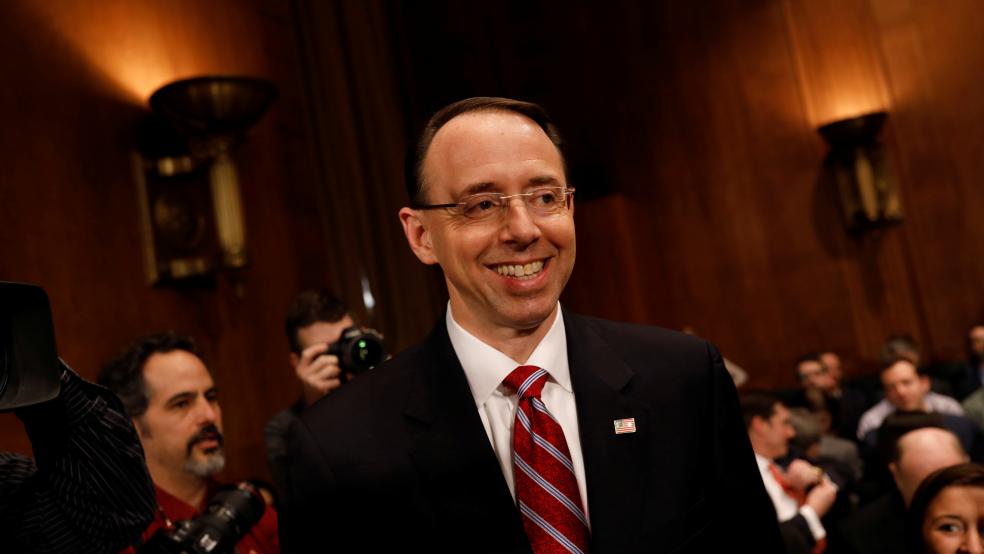It’s safe to say that in normal times, the average American doesn't have a clue who the Deputy Attorney General is. On Wednesday morning, though, Senate Minority Leader Chuck Schumer signaled that the current occupant of that position, Rod Rosenstein, is about to become a household name.
Rosenstein, who was confirmed to his position just two weeks ago, came to the Justice Department after serving for nearly 12 years as the US Attorney for the District of Maryland. At DOJ, he is the final authority on investigations into the possibility that members of the Trump campaign may have colluded with Russian intelligence. That’s because Attorney General Jeff Sessions, who would normally have the final say over everything, was forced to recuse himself from the investigation.
Related: 4 Big Questions Raised By Trump’s Decision to Fire FBI Director James Comey
Among other things, that means that Rosenstein has the unilateral authority to appoint a special counsel to look into the Russia investigation. On Wednesday, Schumer demanded Rosenstein do so rather than allow a new FBI Director, appointed by President Trump, to take charge of the inquiry. He threw Rosenstein’s own words back at him to suggest that the career public servant’s reputation for personal integrity rests on his decision.
It’s a line that other Democrats can be expected to adopt in coming days because on Monday Senate Majority Leader Mitch McConnell squelched the idea of the Senate establishing a special commission to investigate the Trump campaign’s ties to Russia, there has never been much chance of the House aggressively investigating the issue. That leaves a Special Counsel appointed by Rosenstein as the Democrats’ best hope for an independent inquiry.
Rosenstein, widely respected by members of both parties, began his time in government in the Justice Department’s Public Integrity section during the George H.W. Bush administration. After several years, he was hired as an Assistant US Attorney and moved back and forth between prosecutorial work and increasingly senior positions within the main Department of Justice.
In 2005, President George W. Bush nominated him to serve as US Attorney for Maryland, a job to which he was unanimously confirmed by the Senate. Bush later nominated Rosenstein to a federal judgeship, but his appointment was blocked by Senate Democrats, and he remained US Attorney through the end of Bush’s term and the entirety of Barack Obama’s two terms.
Related: Sally Yates Hearing on Russian Meddling: An Odd Display of Senatorial Bluster
It was a memo from Rosenstein that set in motion Tuesday’s surprise firing of Federal Bureau of Investigation Director James Comey. While there is considerable speculation about the real reasons why President Trump wanted Comey fired, Rosenstein laid out a case based on the former FBI director’s handling of an investigation into former Democratic presidential nominee Hillary Clinton during the run-up to last year’s election.
The particulars of Rosenstein’s case against Comey rested on his decision to make a public announcement about his decision not to recommend that charges be filed against Clinton during a press conference in which he nevertheless criticized the former secretary of state harshly for her use of a private email server while running the State Department. He also criticized Comey for his October 28 letter to Congress, announcing that the investigation had been reopened.
The latter move was one that Trump publicly praised at the time. “It took guts for Director Comey to make the move that he made. It took a lot of guts,” he said at a campaign rally in October. Later, after his inauguration, Trump publicly embraced Comey at a ceremony in the White House.
But in his statement on the Senate floor Wednesday morning, Schumer focused less on the Trump administration’s inconsistency, and more on Rosenstein’s description of the toll that Comey’s tenure as director has supposedly taken on the FBI.
Related: From Xi to Duterte: Why Trump Holds His Enemies Closer
“Over the past year...the FBI’s reputation and credibility have suffered substantial damage,” Rosenstein wrote in the memo addressed to Attorney General Sessions. He went on to say that the FBI has lost the “public and congressional trust” and needs a new director in order to regain it.
On the Senate floor, Schumer seized on Rosenstein’s own words to press him to appoint a special counsel. (Schumer frequently uses the outdated term “special prosecutor,” a position that was replaced years ago with the special counsel.)
“What must happen now is that Mr. Rosenstein appoints a special prosecutor to oversee this investigation,” Schumer said. “Deputy Attorney General Rosenstein sat on the Judiciary Committee and promised to appoint a special prosecutor at the appropriate time. He said, ‘I’m willing to appoint a special counsel whenever I determine that it’s appropriate.’”
He also agreed, during his confirmation hearing, that the investigation into Russian interference in the election had to be “fair, free, thorough and politically independent.”
Related: Related: Here’s the Real Puzzle About the Trump-Russia Connection
“If there was ever a time when circumstances warranted a special prosecutor, it is right now,” Schumer said. “Mr. Rosenstein already expressed concern that Director Comey damaged the integrity of the FBI. The attorney general has already had to recuse himself from the investigation for being too close to the president.
“If Mr. Rosenstein is true to his word, that he believes this investigation must be ‘fair, free, thorough and politically independent,’ if he believes as I do that the American people must be able to have faith in the impartiality of this investigation, he must appoint a special prosecutor and get his investigation out of the hands of the FBI and far away from the heavy hand of this administration.”
Expect other Congressional Democrats to adopt the same talking point: That if Rosenstein wants to retain his reputation for integrity, he has no choice but to appoint a special counsel to investigate possible ties between the Trump campaign and Russian intelligence.





